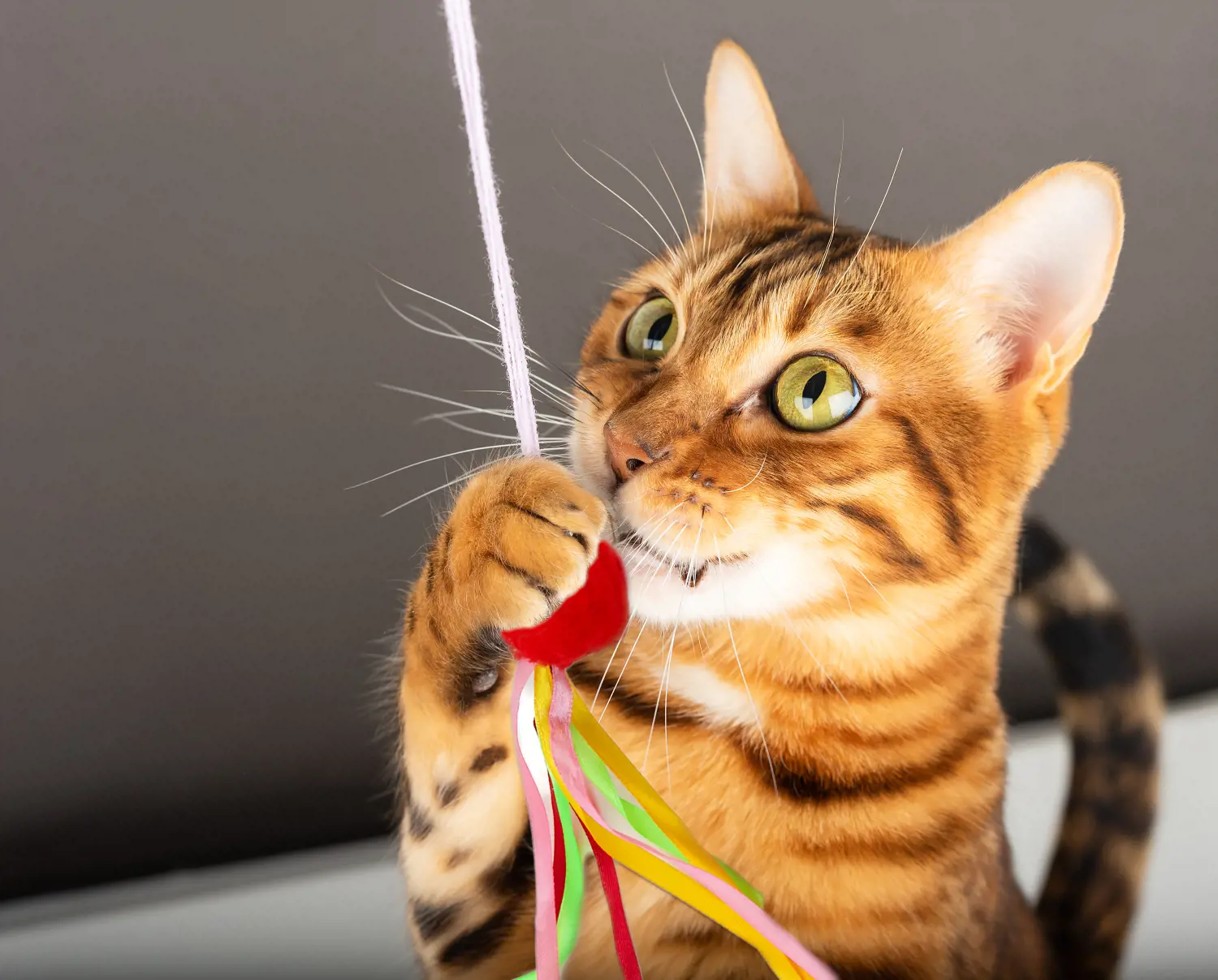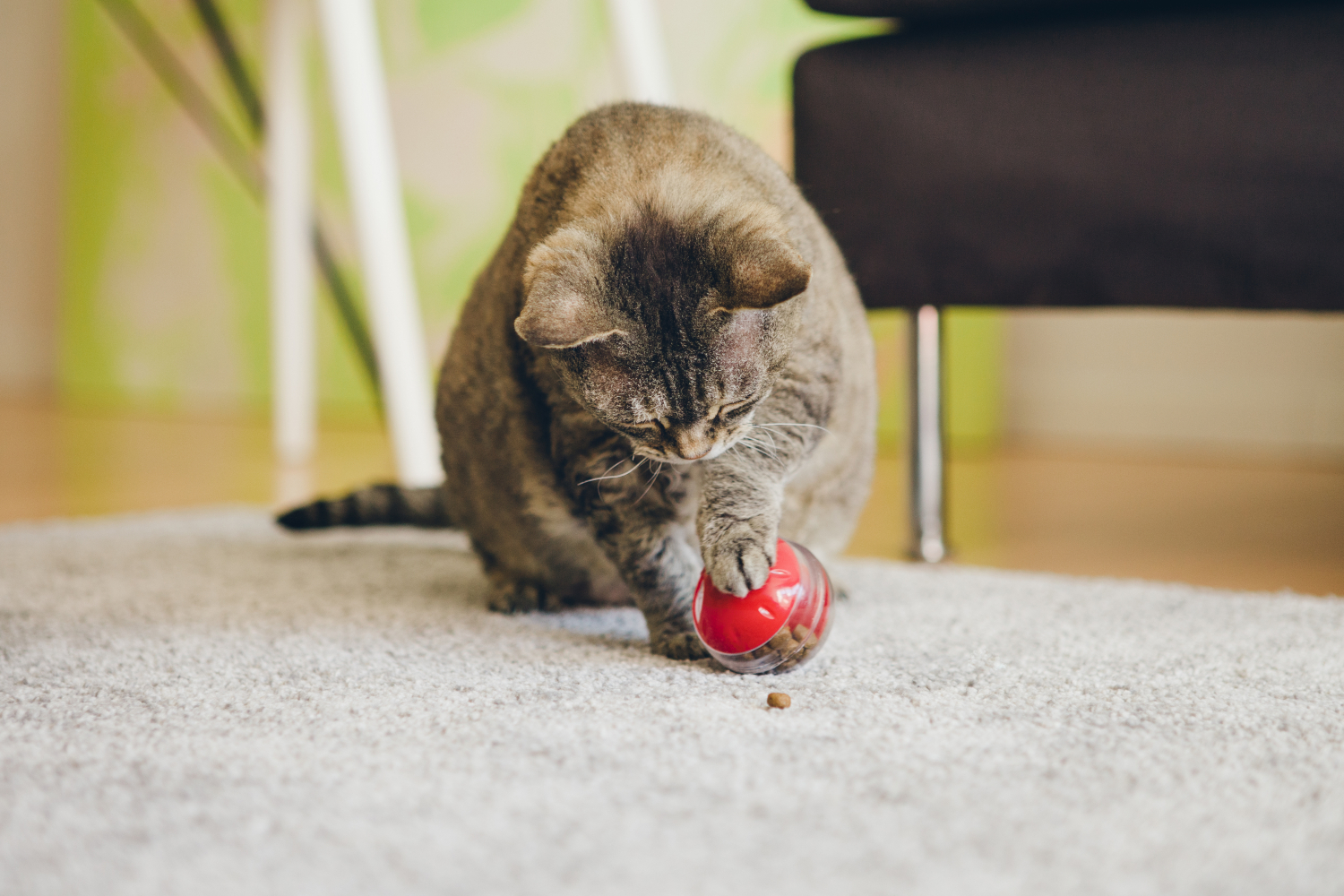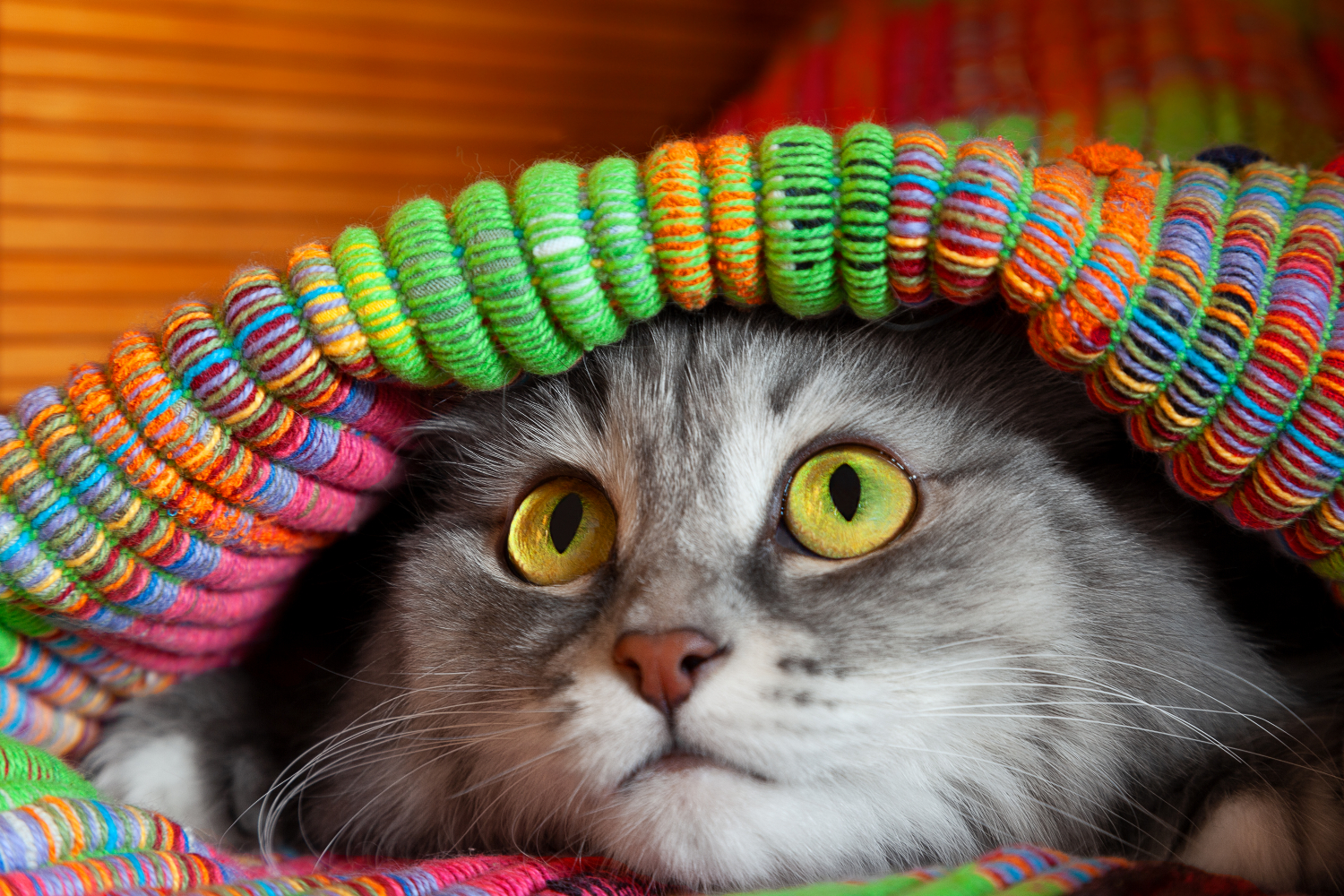7 tell-tale signs of Separation Anxiety in cats and what you can do to help them
7th February, 2023

Do you think your cat becomes stressed when you leave the house? Learn the signs of cat Separation Anxiety here and what you can do to help.
Feisty cats sometimes have a reputation for being aloof and antisocial, although those who own a cat know otherwise.
In fact, your beloved moggy is just as attached to you as your children or dog, meaning they also miss you just as much when you go out.
Sometimes, the longing for their pet parent can become too much for cats, and they begin to suffer from Separation Anxiety. How will you know if your cat is experiencing this?
Discover what to look for in your pet below, ways to help them manage their feelings, and when it’s time to see a vet.
Don’t forget to protect your cat with cat insurance to make sure that you financially supported when they need it most.
How to tell a cat has Separation Anxiety
Cats are experts at hiding their emotions, thanks to their ancestral wild roots. If you have a particularly quiet or grumpy cat, they might find it even harder to express themselves, so how will you know when they feel stressed or sad when you’re gone?
Luckily, there are quite a few tell-tale signs that a cat has Separation Anxiety, so even if your playful pet doesn’t display all the ones we mention below, you should still be able to spot it.
If you suspect your cat has this issue, it’s a good idea to call your vet to ask for tips. Alternatively, use our 24/7 vet video consultation service if you have cat insurance with Purely Pets for some quick, professional advice.
Here are some of the most common symptoms of Separation Anxiety to look out for in your cat friend.
1. Going to the toilet outside the litter box
If you find your cat is urinating or defecating outside their litter box when they are normally good at using it, they may well have Separation Anxiety.
You’ll need to check it isn’t full and in need of a clean, as this can also cause them to go to the toilet elsewhere.
Unfortunately for you, one of the top spots cats choose as their alternative loo is their pet parent’s bed! So, you’ll want to fix the issue before they get used to the new toilet.
2. Destroying things they normally wouldn’t
If your playful cat has grown out of the kitten phase and has a scratching post to file its claws on, the damage done to your home should be minimal to none.
With Separation Anxiety, cats start to look for ways to entertain themselves when you're away or to relieve some of their pent-up stress, which could mean destroying your favourite sofa in the process.
There are a few techniques you can try to prevent your cat from turning your home upside down:
- Create a safe and secure space for them to stay in while you’re out.
- Use spray solutions to deter them from chewing and scratching.
- Tidy away items you don’t want them to touch.
- Find other means of entertainment for them.
- Help them overcome their Separation Anxiety – more on that below!
If your pet is really struggling and starts to become agitated or irritable, it may even start to fight with neighbouring cats, especially if it’s a male.
You need to see a vet for some tips to keep them calm if this is the case, or you might be claiming on your cat insurance when they come home injured after a scuffle.
3. Excessive vocalisation
Has your cat suddenly started howling or crying when they think you’re going out the door? Perhaps your neighbours hear it while you're at the office?
Increased vocalisation is a tell-tale sign that your beloved pet is pining for you to stay at home with them.
Of course, it could also be a symptom of something else, so it’s a good idea to take them for a vet visit to rule out the following:
- Pain or illness
- Cognitive dysfunction syndrome (CDS)
- Hearing loss
4. Grooming more often
Have you ever spent a day at the spa to relieve all that anxiety and stress that’s built up over time? Cats start grooming excessively for a similar reason – for stress relief.
It’s not unusual to see your cat licking its coat at all hours of the day, so how do you know it’s becoming a problem? When your pet develops bald patches, scratches, and skin sores as a result.
This is more common in female cats, but your male moggy might also show these signs.
It’s a good idea to take them to the vet even if you think Separation Anxiety is the cause. Too much grooming can also be due to skin allergies or parasites.
Make sure you have cat insurance in place to help pay for vet bills when you need emergency care for your cat.
5. Hyper-attachment to owner
Some cats are known for liking as little attention from humans as possible, so you might get a warming sensation when they snuggle up on your lap and want to be stroked.
However, if they start seeking your constant attention and follow you into every room, they might have Separation Anxiety.
6. Not wanting to go outside
Did your beloved mog used to love spending hours outside every day but now barely puts a paw outside the cat flap? This is another common sign they have Separation Anxiety, especially if combined with some of the others we’ve mentioned.
As with the other signs, you should give your vet a call to rule out any health conditions that could be causing it to stay indoors. Remember you can use our 24-hour vet video consultation service when you have Purely Pets’ cat insurance.
7. A change in their body language
It can be hard to tell when there’s something wrong with your cat, especially if they are the shy and retiring type, but there some specific body language cues to look out for:
- Dilated pupils and squinting eyes
- Flattened ears
- Excessive lip licking and swallowing
- A hunched, tense body
- Twitching skin (rippling)
These can be symptoms of Separation Anxiety but also signal that they are stressed because of something else. Get them to the vet to get a correct diagnosis so you can treat the issue properly.
Why does my cat have Separation Anxiety?
Seeing your cat so distressed is sad for any pet parent, so getting to the root of the cause is essential to help resolve their Separation Anxiety.
There are a few reasons why your moggy feels this way. Some factors mean they are predisposed to developing the condition while others are environmental.
The most common reasons for Separation Anxiety in cats are:
- They are an indoor cat – If you have a house cat rather than one that comes and goes as it pleases, it’s much more likely to become anxious when you leave the house.
- They are female – This doesn’t mean that all female cats will get Separation Anxiety – they are just more likely to do so than males.
- They left their mum early – If your pet was weaned early, bottle-fed, or even orphaned as a tiny kitten, they might have developed a much greater attachment to humans.
- They are an only pet – If you have no other dogs, cats, or any other animal in your house, your beloved cat is much more likely to seek all your attention.
- They have experienced a change in routine – Cats are creatures of habit, and they love routine, so any disruption to their normal schedule or environment can stress them out. This could be anything from moving house to a new baby in the family.
How do vets diagnose Separation Anxiety in cats?
Diagnosing Separation Anxiety in cats is crucial to stop it from leading to more serious health concerns, like the following that Blue Cross mention:
- Diarrhoea
- Urinary tract conditions
- Skin problems
- Digestive issues
- A lack of appetite
To determine whether your cat has the condition, your vet will ask you questions about its behaviour at home, so note down any details before your appointment to make sure you don’t forget anything.
They will also perform a range of physical exams and ask for blood work to rule out any medical issue.
It’s vital you protect your pet throughout its life with cat insurance. This way, you can alleviate the financial burden that comes with seeking medical care for your cat when it is needed most.
How to treat cats with Separation Anxiety
Every pet parent wants their cat to be happy, so what can you do to make sure yours feels calm and relaxed and that they stay that way while you leave the house?
Keep calm
If your cat’s behaviour is making you worried and stressed, it might be worsening the situation. Cats can pick up on how you’re feeling, so the more chilled you seem, the more likely they are to follow suit.
Try your hardest to ignore their attention-seeking ways and only give them the cuddles and strokes they want when they are calm and showing their independence. The same goes for when you get home from work – wait until they relax to give them affection.
Provide the right environment
Perhaps your cat is stressed and anxious because they don’t like their environment. Take a look at your setup and see if there are adjustments you can make to help them feel more secure and in control.
Make sure their litter box isn’t close to their food and water bowls but that they are all easily accessible. They also need somewhere calm and quiet to relax during the day. If your cat is really missing you, you could try leaving some peaceful music on, so they don’t feel so alone.
If you need any more tips on creating the ideal environment for your pet, call your vet or use our 24-hour vet video service if you have cat insurance with Purely Pets.
Install a cat flap
If you don’t already have a cat flap for your moggy, now is a good time to install one. This allows your cat to feel more in control and lets them come and go as they please.
You can even get high-tech models nowadays that recognise your cat’s microchip and only let them inside the house. You can also lock them if there are certain times of the day you don’t want your pet wandering outside.
Work on their routine

As we mentioned above, cats love routine, so making sure there is consistency in their schedule is one of the best ways to combat Separation Anxiety.
Here are a few suggestions to help get you both into a good routine:
- Feed them at the same time daily.
- Clean the litter box every day.
- Play for the same amount of time and at the same time.
- Create a coming and going ritual for when you leave home, so they know what to expect.
- Stick to the same bedtime
Find other distractions
Your cat might be missing you because it’s feeling bored. Cats do sleep a lot, but they also need a lot of mental and physical stimulation to stop them from destroying your furniture or meowing the house down.
Make sure you have plenty of toys to keep them occupied and a cat activity centre for them to play on and spend time relaxing in.
| Great cat toys to keep your feisty cat stimulated |
| Trixie Cat Activity Snack Ball (£4.49 from Amazon) - Keep your pet's mind and body busy by trying to get treats out of this rolling ball. |
| 6 Pack Catnip Mouse Toys (£6.99 from Amazon) - These fun little mice are a cat favourite and feed their natural urge to hunt while helping to clean their teeth. |
| KONG Kickeroo Cat Toy (£7.94 from Amazon) - Let your cat wrestle for hours with this paw kicking toy before falling asleep snuggled up with it. |
| FurDreams Cat Wand (£9.99 from Amazon) - Bond with your cat companion with this fun fishing rod and reduce their stress by play-hunting. |
Speak with your veterinarian
If you’ve tried all the above and your cat is still showing symptoms of distress, it’s time to take them to the vet. There might be underlying health issues, or they might need more help with their behaviour.
If you’re finding it difficult and would like professional help, contact the Animal Behaviour and Training Council. Here, you can find a qualified cat behavioural therapist who may be able to help your anxious kitty.
Should I get another cat to prevent loneliness?
If your cat friend has Separation Anxiety, you might be tempted to get them a playmate. You’ll need to be very careful, though, as this could cause an older cat to become even more stressed and seek solitude somewhere else in the house or outdoors, and that’s the last thing you want!
Adopting kittens together from birth can work well, but be cautious when getting a youngster when you already have an established cat family member.
Young kittens might be tempted to steal your senior’s food or take their favourite spot on the windowsill, which could lead to scraps as your older cat protects its territory.
Taking the appropriate steps to address your cat's Separation Anxiety may work better than introducing them to another cat.
What else can cause stress in cats?
If your cat is showing signs of stress but you’re sure they don’t have Separation Anxiety, it might be down to something else, like:
- Fear
- Frustration
- Depression
- Boredom
- Pain
- Illness
As Cats Protection says, a stressed cat can become emotionally and physically unwell, so getting them seen by a vet is crucial to their well-being.
Remember to take note of your pet’s behaviour so you can tell your vet as much as possible about their condition. The more your veterinarian knows about your cat, the easier it will be to diagnose them.
Make sure you have cat insurance in place in case your faithful cat needs emergency care for a medical issue. The last thing any pet parent wants is to see their beloved animal suffer because they can’t afford the treatment but knowing that the financial aspect will be covered for after will lift this burden.
How can I tell my cat is happy?
If you detected Separation Anxiety in your faithful cat and want to know if your efforts to make them feel safe, secure, and happy are working, you need to know what signs to look for.
You can tell your cat is more laid-back and less anxious when you notice the following:
- A gently swaying tail from side to side
- Dozing off easily
- Gentle grooming
- Soft purring
- Ears pointing upwards and forwards
- Seeming interested in their surroundings
- Lying on their side and exposing their tummy
- Eyes slowly closing and opening
- A generally relaxed demeanour
Protect your feisty cat with cat insurance

Cats bring joy to their owners during their adorable kitten years and well into old age, so it’s only natural you would want to protect them in case they get ill or injured.
Having a cat insurance policy in place means you can get your pet care and treatment in an emergency without having to worry about paying a huge vet bill.
When you choose to insure your cat through Purely Pets, you get the following benefits:
- No upper age joining limit
- 15 levels of lifetime cover to choose form
- Lifetime protection up to £15,000
- Easy policy management online
- Access to the 24/7 vet video app
- Payments made direct to your vet
Do you want to protect your cat friend with award-winning cat insurance? Contact Purely Pets today.
Helpful Pages
Recent Posts
Pet Insurance Quote
- 98% claims paid *
- Claims paid directly to vets
- 24/7 vet video consultations
- Interest free monthly payments




